Russian media no longer dazzled by Trump
- Published
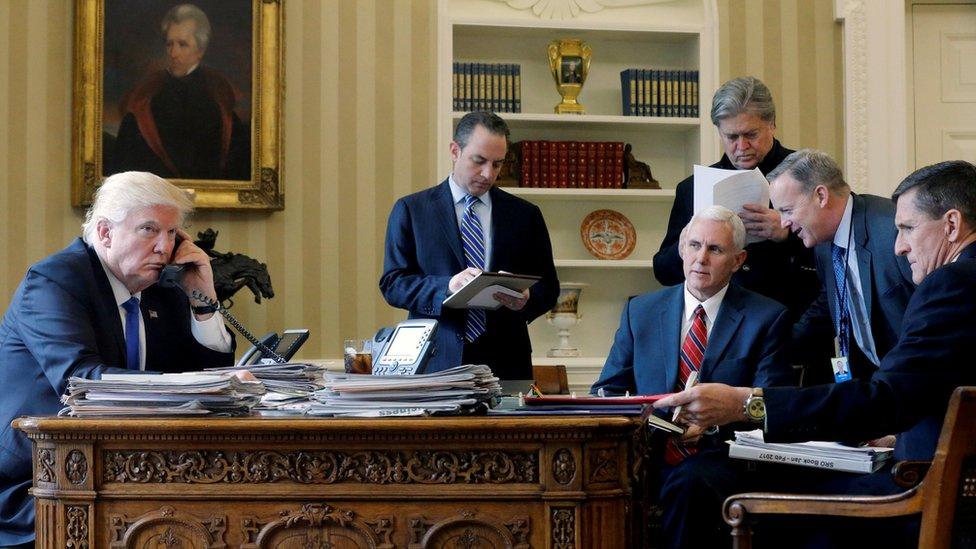
28 January: President Trump (left) speaks to Vladimir Putin on the White House phone
For several months, the pro-Kremlin media had nothing but praise for Donald Trump.
During the US election campaign, Russian state TV bulletins and pro-government newspapers portrayed him as some kind of David taking on the Goliath of a "corrupt… Russia-hating" Washington elite. They welcomed his calls for warmer US-Russian relations. They played down some of his more outlandish comments.
It was almost as if a US presidential candidate, and subsequently a new US president, had become the golden boy of Russian politics. In January he even received more mentions in the Russian media than President Vladimir Putin.
But I detect a change in tone.
On Friday, Russia's most popular tabloid, Komsomolskaya Pravda, accused President Trump of making "contradictory" statements about Nato.
The paper points out: "(During the election campaign) Trump had called the Alliance obsolete and useless. Less than two months have passed since he moved into the Oval Office and he's already expressed full support for Nato.
"As the saying goes, you need to be drunk to understand the true position of America's president."
Tillerson 'tense, confused'
Friday's edition of the Russian government paper, Rossiyskaya Gazeta, notes: "Recently the White House has been making many contradictory and incompatible statements about the foreign policy direction of Trump's team, including issues that affect Russia's interests."
Reporting Thursday's meeting in Bonn between Russia's Foreign Minister Sergei Lavrov and the new US Secretary of State, Rex Tillerson, the paper emphasises "it was obvious how tense and, at the same time, confused Tillerson looked".
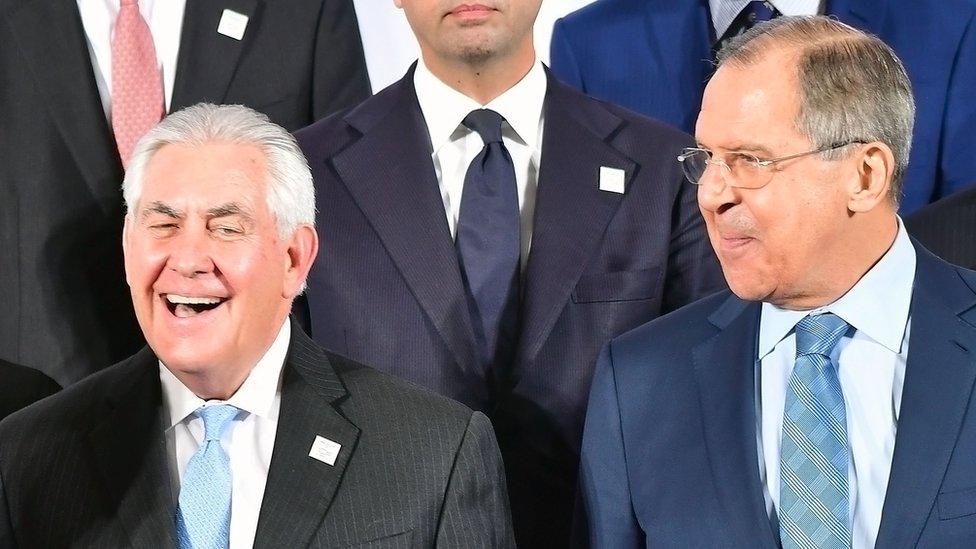
US Secretary of State Rex Tillerson (left) and Russian Foreign Minister Sergei Lavrov met in Bonn on Thursday
Meanwhile, Nezavisimaya Gazeta warns against "excessive Trumpophilia".
And with President Trump under sustained pressure back home over alleged links to Russia, the business daily Vedomosti doubts he will have "flexibility… in talks with Russia.
"Every step he takes, particularly any concessions, will be examined under a microscope. It's even hard to believe now that there ever was a window of opportunity (to improve relations) that made it seem worth raising our glasses and toasting Trump's victory."
Readjusting focus
In recent days there has been noticeably less Trump on Russian TV.
The resignation of the president's national security adviser Michael Flynn on Tuesday may have made headlines around the world. But it was not mentioned in Russian state TV's 45-minute evening news bulletin. That is extraordinary, considering that Russia was central to the story.
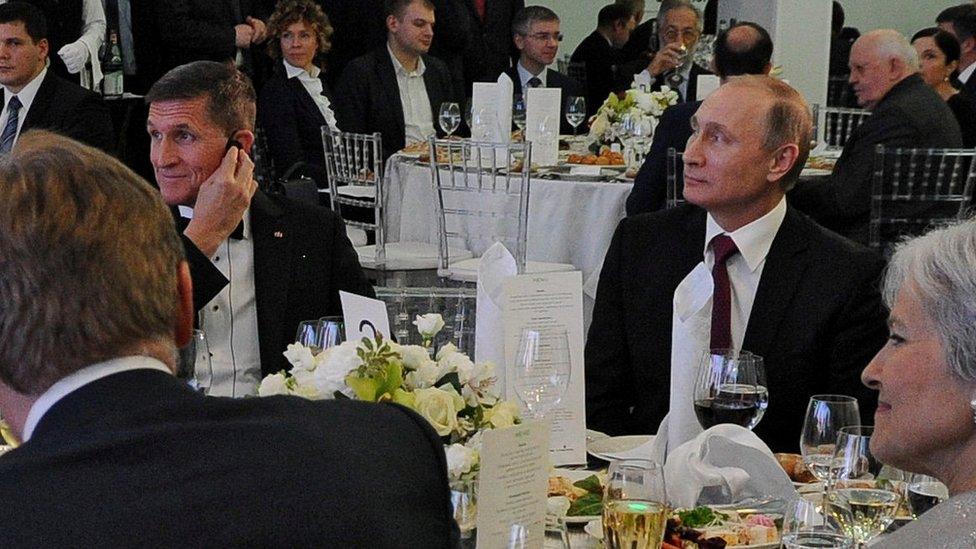
December 2015: Gen Flynn (left) sits next to President Putin at a dinner in Moscow
There are reports that state television has been instructed to scale back its coverage of the US president. The Kremlin has dismissed these as "rumours".
"I was told by someone closely connected to one of Russia's main state TV companies that such instructions exist and were issued in the wake of Flynn's departure," says Konstantin Eggert, a political commentator for the independent channel TV Rain.
"As far as I know, the idea is not so much to present him in a negative light, but to scale down coverage of the United States in general. Inevitably I think there's going to be a scaling down of positive coverage of Trump, too. The Kremlin's idea is to reduce expectations from this much-anticipated detente between Moscow and Washington."
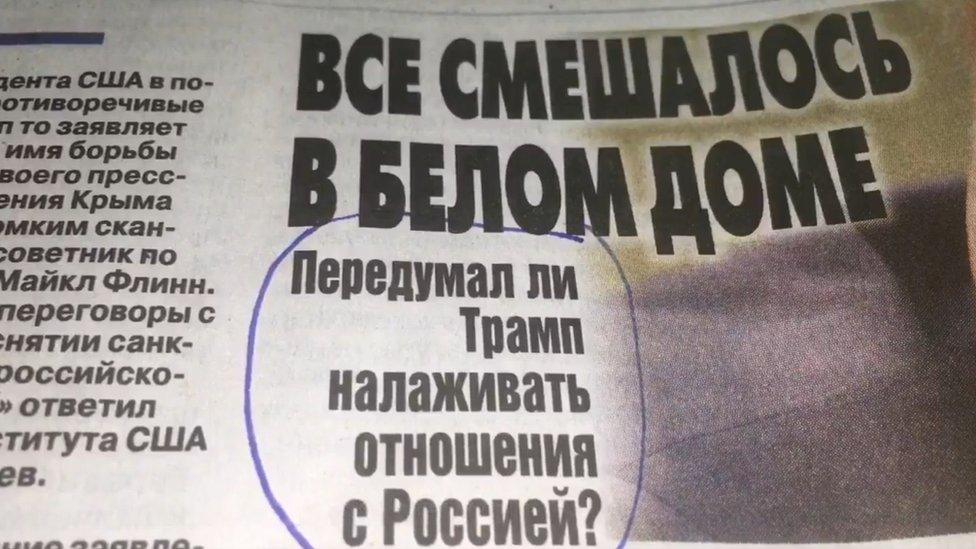
"Everything's a muddle in the White House", says Moskovsky Komsomolets
President Putin's spokesman told the BBC reports of Kremlin meddling were "absolute rubbish" and "fake news".
"TV channels and the Russian media have total independence to decide their own editorial policy," Dmitry Peskov told me.
I asked him whether he thought it was odd that Russian TV channels appeared to have reduced their coverage of Mr Trump.
"To be honest, we don't study so closely the proportions in which different stories are reported," he replied.
US sets out cautious approach to Russia
Celebrations premature?
Last November one Russian official admitted to me having celebrated Mr Trump's victory - with a cigar and bottle of champagne.
So why has the champagne gone flat?
Judging by the angry reaction of senior Russian politicians, Moscow was disappointed by Michael Flynn's departure. The Trump adviser had championed closer US-Russian ties.
Then came White House comments about Crimea, making clear that President Trump expects Russia to return the annexed peninsula to Ukraine.
To Russia it seemed a sudden 180-degree turn. During the election campaign Donald Trump had told ABC television: "The people of Crimea, from what I've heard, would rather be with Russia than where they were."
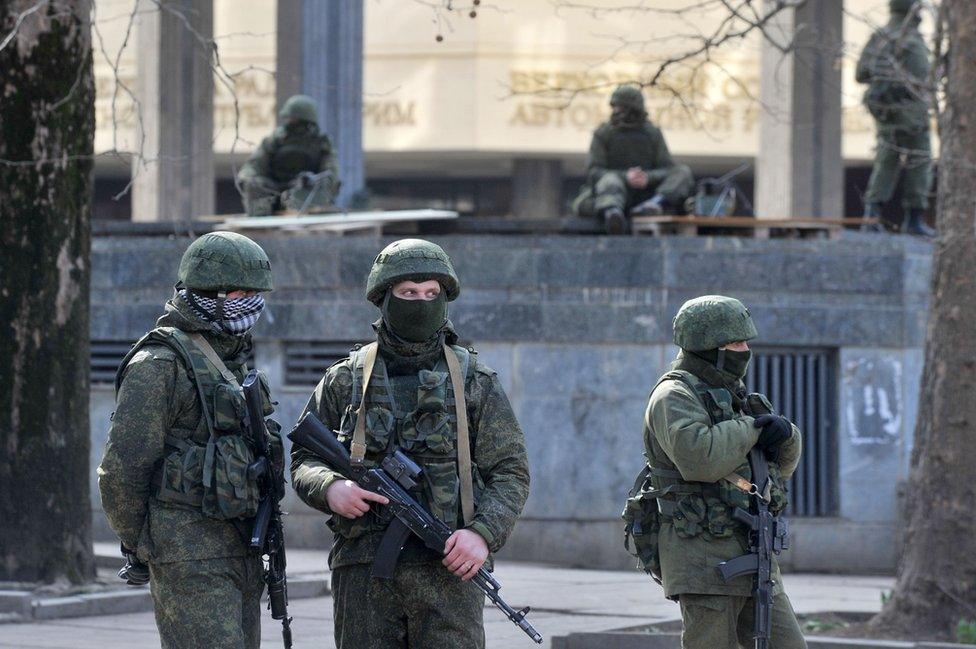
Crimea, March 2014: pro-Russian troops in unmarked uniforms seized key buildings
And on Thursday senior members of the Trump administration sounded less than enthusiastic about the idea of a rapprochement with Moscow.
US Defence Secretary James Mattis said Washington was "not in a position right now to co-operate on the military level… Russia's aggressive actions have violated international law and are destabilising."
US Secretary of State Rex Tillerson indicated that America "will consider working with Russia". That is hardly a ringing endorsement.
Yet Donald Trump has made it clear he still believes a better relationship with Vladimir Putin and Russia is good for America. Could he once again becoming the American darling of the Russian media?
That will partly depend on whether the two presidents can strike up a good relationship when they eventually meet.
But it depends, too, on how much pressure President Trump will be under by then, over his team's alleged Russian connections.